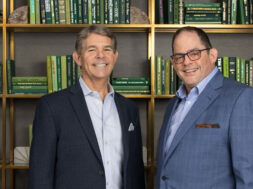Thriving Through a Downturn
With the Great Recession in the rearview mirror and signs of slowing growth, private equity leaders share their insights from the last downturn and how they're preparing for the next.

Cookie dough isn’t a cute business for Loren Brill. She was very serious when she started her New York-based company, Sweet Loren’s, in 2008.
Recovering from Hodgkin’s lymphoma, which derailed her intention as a recent college grad to get a corporate job, Brill realized how much better she felt eating “clean” foods made with simple, unadulterated ingredients. As she refined her recipes to eliminate gluten and dairy products, she discovered a then-overlooked market of consumers who had to avoid those and other problematic contents.
Whole Foods was her first customer. Now, Sweet Loren’s cookie dough is distributed through 10,000 grocery stores and Brill is gearing up for a Series A round of financing so she can expand into food service and coffee shops, and launch new product lines.
An infusion of $5 million to $10 million would be a safe bet, even if the economy falters, says Brill, now 35.
“People have to eat,” even in a recession, she says, and those with allergies and preferences don’t have many options when it comes to healthy sweets, especially at reasonable prices. “If anything, during a recession, people will want cookies more,” she adds.
Bracing for a Slowdown
If Brill is right, the U.S. might be reaching for the cookie jar soon. Indications suggest an economic slowdown is on the way. Investors and executives who weathered the Great Recession, which bottomed out in 2008 and 2009, say they are putting that searing experience to good use as they brace for a potential downturn.
When it inevitably hits, the end of the current market cycle will likely be less of a shock and more of a “softening,” says Rob Holland, managing partner of CREO Capital Partners, a private equity group that owns the 505 Southwestern line of salsas and snacks, as well as Flagship Food Group and several other companies. “There’s enough momentum to keep us from a repeat of 2008,” he says.
Economists concur.
“Households have become very frugal. In 2008, people loaded up on housing debt. It’s the exact opposite now.”
Michael Walden
Professor, North Carolina State University Poole College of Management
“It has been 10 years since the Great Recession and we’re not looking at anything like that,” says Michael Walden, a William Neal Reynolds distinguished professor and extension economist at North Carolina State University and a member of the graduate Economics faculty with The Poole College of Management. While home values have rebounded erratically, benefiting some regions more than others, overall household debt is lower and homeowners are not tapping their equity. “Households have become very frugal,” Walden says. “In 2008, people loaded up on housing debt. It’s the exact opposite now.”
The National Association for Business Economics said in December 2019 that its members expect growth in the American economy to dip below 2% in 2020.
And there are signs some private investors are prioritizing cash, likely with a recession in mind. The 2019 UBS Global Family Office Report found that 55% of family offices foresee a recession in 2020. Consequently, many of those who expect a downturn are adjusting their investment strategies accordingly, seeking to minimize risk and to have plenty of cash available for unexpected bargains.
Essential Services
As the longest economic expansion in U.S. history enters its late stages, one investment segment attracting private equity interest is B2B companies whose services become part of customers’ core operations. Software as a service models and outsourced services relieve customers of margin-crushing overhead while requiring them to commit to long-term contracts, cementing cash flow for the businesses providing the services. When services are hard-wired into customers’ operations, it’s difficult for even lower-cost providers to uproot them, investors say.
Drawn to the outsourced services model, in 2008 Incline Equity Partners bought a stake in a company that installs and operates washers and dryers in college housing complexes.
“It’s the definition of a recession-resistant business. The fundamental demand is not affected by the economy’s performance,” says Jack Glover, a founding partner of Incline, citing the never-ending flow of laundry. The business also offers a surprisingly consistent stream of cash-flow enhancements. Having sold the company and reacquired it in 2019, Incline now plans to upgrade old-school washers and dryers with smartphone-enabled, app-based payment systems. Replacing quarters with digital coins will rapidly lower maintenance costs, Glover predicts.

“It can be tempting to pursue the next shiny object, but there needs to be discipline so you don’t become overextended at the wrong time.”
Jeffrey Stevenson
Managing Partners, VSS
Another “essential services” business that Incline bought in the depths of the recession is Apex Analytix, which installs and manages specialty accounting software to recover unintended overpayments to vendors and suppliers. Apex Analytix charges a flat fee plus a small slice of the revenues it recaptures for its clients. It’s the ultimate recession-resistant company because it uncovers money to channel to its clients’ bottom lines—an especially appealing proposition when other sources of revenue go dry.
Jeffrey Stevenson, managing partner of VSS, a New York-based private investment firm that focuses on the lower middle market, is eyeing a potential downturn from a very different perspective than he had in 2007.
Back then, VSS was still investing in media, where it had its roots. “Media is driven mostly by advertising revenues, which tend to be procyclical and easy to cut in a downturn,” Stevenson says. “In the Great Recession, media companies were negatively impacted by the cyclicality of advertising, the secular change from print to digital, and the leverage in typical deal structures back then.”
Now, VSS prefers companies that infiltrate customers’ operations.
In 2011, VSS acquired Strata Decision Technology, which streamlines health care financial operations, in part by detecting ways to trim costs and plan for capital improvements. “It is embedded in how the entire hospital operates, including clinical, operational and financial,” Stevenson explains.
The investment was attractive for many reasons. Strata, which was sold to Roper Industries in 2015, signed up clients for five-year contracts and had a 98% renewal rate, according to Stevenson. Plus, businesses with outsourced services can use technology to bring costs down from what clients can do on their own, making the services valuable even if the economy were to slow. Says Stevenson: “In a recession, there’s still a great need for services that lower cost.”
Essential Services
Kodiak Building Partners rose from the ashes of the 2007 housing meltdown, in which Americans collectively lost 30% of their home equity.
The company was formed in 2011 when Wolverine Investors, whose partners all had experience in the building industry, led a group of private investors to acquire producers and suppliers in the housing and construction vertical. Their goal wasn’t just to buy in time for the economic recovery; they aimed to create a basket of locally owned companies whose collective diversity was inherently stable.
Headquartered in Littleton, Colorado, Kodiak now owns 23 locally focused companies in 14 states. To further its growth, in 2017 it partnered with buyout firm Court Square Capital.

“If you have a diversified portfolio, with both premium and value, a recession won’t have as dramatic of an impact on your top line.”
Rob Holland
Managing Partner, CREO Capital Partners
Through acquisitions, the company benefits from economies of scale, explains Kodiak controller Darius McCurty, and longer-term results are stoked not by increasing prices but by helping local company owners learn better ways to navigate the notoriously fickle industry.
“Raising prices on customers is the last thing we want to do,” McCurty says. “It’s about better buying and not carrying a lot of inventory and accounts receivable, and making sure you have good terms and conditions for local customers.”
Relationships with local builders and contractors are the heartbeat of the industry. Kodiak coaches the finance staff at its companies on best practices for cash flow and customer management, always within the context of cultivating long-term relationships.
It’s common in the industry for contractors to use personal guarantees to place orders, and those off-balance-sheet relationships translate to cash flow when times are tight—at least, that’s how things played out in the last recession, says McCurty. “People owe companies, but they pay people they like. It’s rapport that puts you at the top of the payment list.”
Beware Shiny Objects
While some CEOs might hanker for the bargain-hunting bonanza of a recession, great deals aren’t as plentiful as one might think, says Stevenson of VSS. Growth-minded CEOs sometimes have to be reined in lest they buy based primarily on price, and in their excitement, overlook strategic fit and the fundamentals of a potential acquisition.
“It can be tempting to pursue the next shiny object, but there needs to be discipline so you don’t become overextended at the wrong time,” Stevenson says, referencing his aversion to adding excess debt to a business. He sometimes directs CEOs to turn their attention away from hunting down deals and to focus instead on building up talent and polishing operations.
For Incline’s Glover, two words summarize his main operating insight from weathering the 2008 recession: “Buckle in.”
Back then, he worked with executives of portfolio companies who had to make hard decisions quickly. The overriding goal of surviving a recession is to aim for the recovery, he says, rather than reacting to the fear and chaos of the moment.
Incline had pulled back a bit in 2006 and 2007, sensing an overheated economy and anticipating a recession, though it was taken by surprise by just how bad 2008 actually was, Glover recalls.
During a downturn, it takes a steady hand to identify the best opportunities among abundant reasonably priced targets, he adds. Privately owned companies that had spurned Incline’s interest in the early 2000s were suddenly more than willing to sell—often for 10% to 20% less than they had previously demanded.
Diversify to Thrive
While Brill is right—in any economy, people still need to eat—it’s also true that during a recession, consumers have shown a willingness to try unfamiliar brands in an effort to save money. Some permanently change their buying habits.
A McKinsey report found that about 18% of consumers traded down to lower-priced brands during the recession. Nearly half of those— 46%—were pleasantly surprised by the quality of the cheaper goods.
That willingness to experiment could spark further growth in CREO Capital’s portfolio, which is evenly split between private label and branded goods, according to Holland. Its private label offerings are distributed through grocery stores.
Some consumers find they prefer the lowercost options over name brands and stick with them even as their disposable income grows during an economic recovery, Holland reports. While some consumers move down the prestige scale, others upgrade to fancier brands and specialty foods.
That explains why CREO’s variety of offerings, found in retailers ranging from Whole Foods to Dollar Tree, grew its top line by 21% from 2007 to 2008, and then by 42% from 2008 to 2009—the worst years of the Great Recession. “In the years after the recession, the growth profile softened,” Holland says. Now, it’s back to 43% growth, driven by craft, premium and non-GMO brands that consumers crave.
“Yes, people have to eat, but they still have choices,” he says. “It’s not as simple as ‘food is recession-resistant.’ A recession brings some consumers into the world of value, and when the economy strengthens again, those consumers [are] retained.”
The truism that consumers are much more open to alternatives in a recession is less comforting for investors in other categories. Household goods, electronics and similar purchases that can be put off don’t follow the same pattern. People don’t have to upgrade their television and wardrobe—at least not with the same urgency as purchasing food.
Still, the lesson holds for investors, Holland says: “If you have a diversified portfolio, with both premium and value, a recession won’t have as dramatic of an impact on your top line.”
This story originally appeared in the January/February 2020 print edition of Middle Market Growth magazine. Read the full issue in the archive.

Joanne Cleaver has been covering entrepreneurship and business growth for over 30 years for national media, as both a staff and freelance journalist. Read more from Joanne at www.jycleaver.com.


